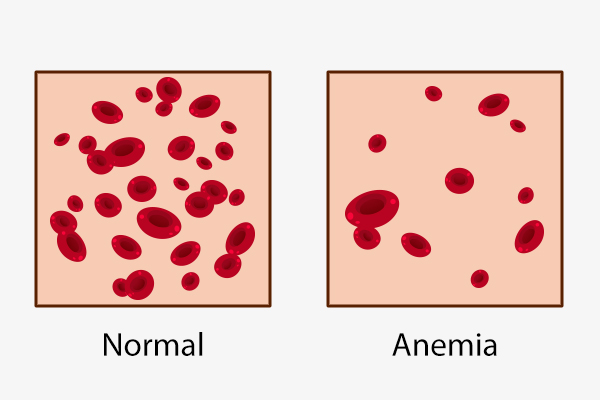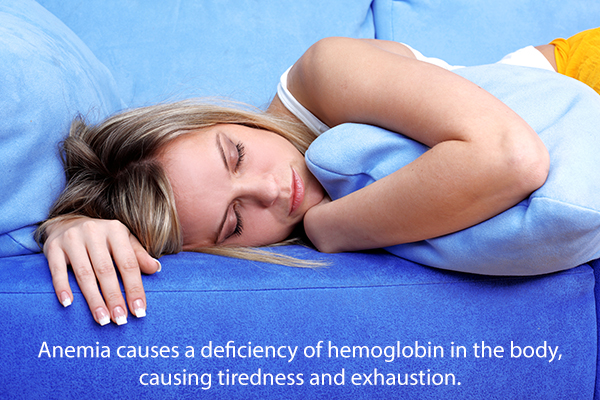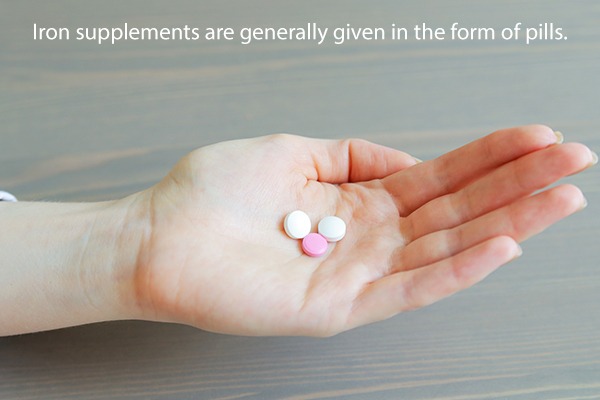In this article:
Anemia refers to a lack of healthy red blood cells (RBCs) in the body. Red blood cells contain hemoglobin, a protein that carries oxygen to be distributed throughout the body.

Therefore, a lack of healthy red blood cells results in an oxygen deficiency in the body organs, consequently impairing their function.
How Common Is Anemia?
Anemia is estimated to affect approximately 25% of the world population, accounting for 8.8% of the total global disease burden. (1) According to the World Health Organization, approximately 1.62 billion people around the globe are anemic. (2)
Anemia is most common among preschool-age children (47%), pregnant women (41%), and non-pregnant women (30%). Also, 25% of school-age children, 24% of people above 60 years, and 12% of men are affected by anemia. (2)
Additionally, around 56% of pregnant women belonging to low- and middle-income countries have anemia. (3)
Types of Anemia

The types of anemia include:
1. Iron-deficiency anemia
Iron is vital for the production of hemoglobin. A deficiency of iron due to poor iron absorption by the body, lack of iron in food, or heavy blood loss can thus result in anemia.
Iron-deficiency anemia often indicates micronutrient deficiencies in children below 5 years and women in their reproductive age. (4) This condition is seen in 2% of adolescent girls, which is generally associated with menstrual blood loss or growth spurt. (5)
2. Vitamin-deficiency anemia
Poor dietary intake can cause a deficiency of folate, or vitamin B12, in the body, in some cases causing anemia. Folate deficiency is also known to decrease the life span of red blood cells. (6)
3. Aplastic anemia
This rare type of anemia occurs due to problems in the bone marrow that inhibit the production of blood cells, including red blood cells, platelets, and white blood cells.
4. Hemolytic anemia
This type of anemia is caused by a rapid breakdown of red blood cells in conditions such as thalassemia, sickle cell anemia, and G6PD deficiency.
5. Sickle-cell anemia
It is a hereditary condition characterized by an abnormality in the hemoglobin protein, which makes the red blood cells rigid. The changed red blood cells clog up in the small blood vessels, preventing proper circulation.
6. Anemia caused by chronic conditions
Different medical conditions, such as kidney disease and rheumatoid arthritis, can inhibit the production of red blood cells.
7. Medication-induced anemia
Certain drugs can lead to anemia as a side effect.
Causes of Anemia
The causes of anemia can be classified into three categories:
1. A problem or decrease in the production of red blood cells
This may occur due to an acquired or inherited condition, including:
- Poor diet
- Abnormal hormone levels
- Chronic diseases
- Aplastic anemia
2. Blood loss
This is the most frequent cause of anemia, especially iron-deficiency anemia. Moreover, bleeding associated with trauma, surgery, menstruation, or internal bleeding in the urinary or digestive tract can also lead to anemia.
3. Destruction of red blood cells
Some conditions such as hemolytic anemia and certain medications can shorten the life span of red blood cells. Apart from these causes, other factors that can lead to anemia include:
- Heavy periods
- Bleeding ulcers
- Colon polyps or colon cancer that is bleeding
- Inherited disorders
- Lack of folic acid, iron, or vitamin B12 in the diet
Symptoms of Anemia

Anemia causes a deficiency of hemoglobin in the body. Thus, the heart increases the pumping of blood to meet the necessary oxygen supply requirements. As a result, the person gets easily tired and exhausted.
Other symptoms associated with anemia include:
- Dizziness or lightheadedness, especially during standing up or movement
- Craving for unusual things such as clay, ice, or dirt
- Inability to concentrate
- Constipation
- Headaches
- Irritation
- Pounding or whooshing sounds in the ear
- Fainting
- Tongue inflammation along with pain
- Brittle nails
- Hair loss
- Shortness of breath
- Chest pains
- Abnormal blood pressure
- Jaundice
- Pale skin
- Increased heart rate
- Enlarged spleen, liver, or lymph nodes
- Irregular menstrual cycles
- Heart murmur
- Lack of exercise tolerance
- Muscle aches
Standard Medical Treatment for Anemia

Depending on the reason and severity of your condition, the following medical interventions may be suggested:
1. Erythropoiesis-stimulating agents (ESAs)
These medicines help increase the production of red blood cells in the body.
2. Iron supplements
These supplements are generally given in the form of pills. You may require intravenous iron infusions if the condition is severe.
Note: Avoid the intake of milk or antacids with iron supplements as they can interfere with iron absorption. Vitamin C can help with the absorption of iron when taken together.
3. Red blood cell transfusion
Red blood cells are transferred from a donor through intravenous therapy, increasing the number of red blood cells immediately.
Diagnosing Anemia
The doctor may perform a physical exam and ask about your and your family’s medical histories. He may ask questions about digestive problems such as bloody stools and very dark or black-colored stools.
For women, the doctor may take details about the menstrual cycle. The most common test used for diagnosing anemia is a complete blood count (CBC). Other tests include:
- Blood tests for levels of iron, folic acid, vitamin B12, and other micronutrients
- X-ray
- Endoscopy
- Colonoscopy
- Bone marrow test
Risk Factors for Anemia
People belonging to the following groups are at a higher risk of developing anemia:
- Women: Blood loss associated with childbirth and menstruation can cause anemia, especially if the woman has fibroids or heavy blood flow during her periods. Pregnancy is also a cause of anemia.
- Infants: When switching to solid food from breast milk, infants can face iron deficiency as their body cannot absorb iron from solid foods easily.
- Elderly: People above 65 years of age are likely to have low-iron diets and chronic conditions that can cause anemia. Polypharmacy in the elderly can also increase their risk of anemia.
- Vegetarians: A lack of iron-rich foods is common among vegetarians or vegans as the body cannot absorb iron from vegetables as easily as from animal sources such as meat, fish, and poultry.
When to See a Doctor

It is recommended to check with your doctor in any of the following cases:
- You experience symptoms such as fatigue, pale skin, or unusual cravings.
- You have an irregular heartbeat, chest pain, or shortness of breath.
- You have dark, black, or bloody stools.
- You passed out.
- You frequently feel faint with minimal activity.
Final Word
Anemia is a prevalent condition and is more common in women than in men. It causes tiredness and fatigue, often interfering with your daily life. Therefore, it is vital to get a proper diagnosis and consult a doctor for proper treatment, diet, medication, and supplements.

- Was this article helpful?
- YES, THANKS!NOT REALLY


